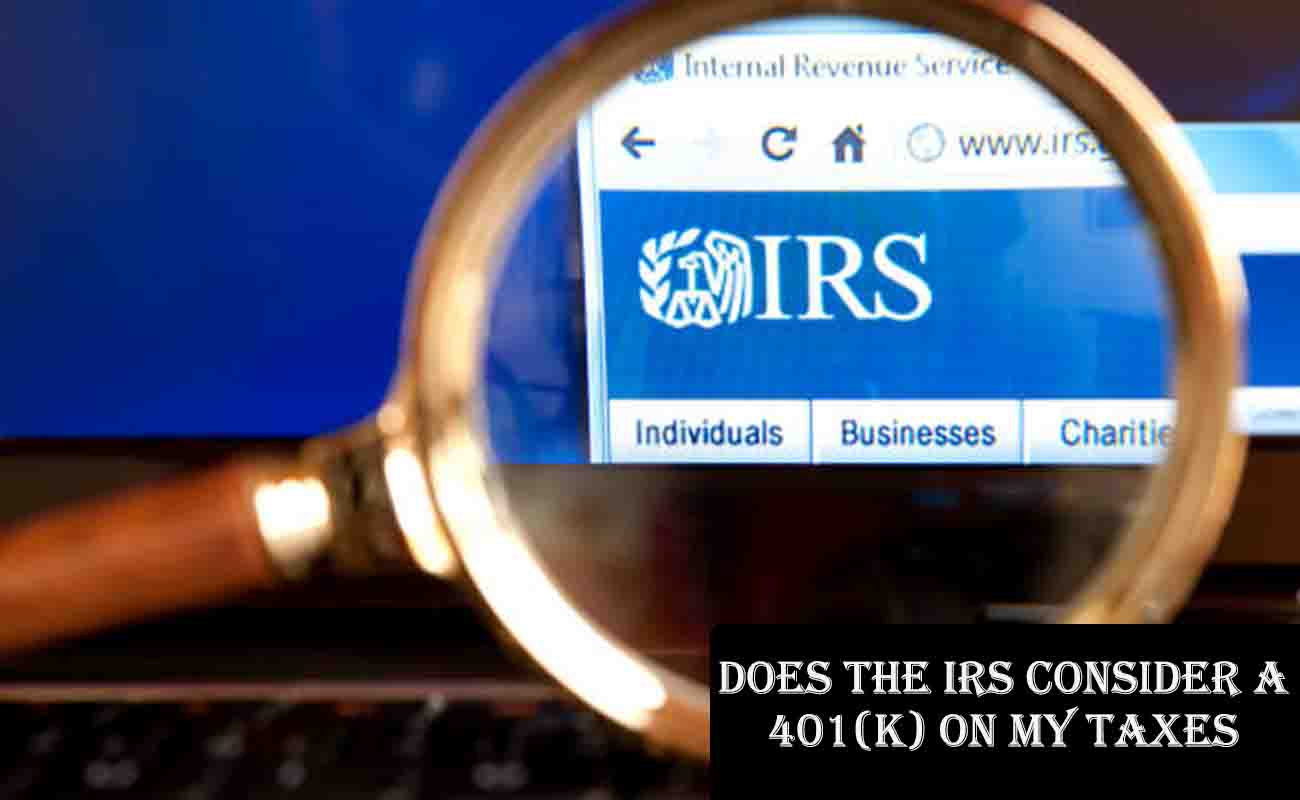One question frequently arises while making retirement savings plans: Does the IRS consider a 401(k) on my taxes? Yes, but how it’s taxed depends on a number of variables, such as whether you’re actively making contributions or withdrawals and if your account is regular or Roth.

Managing your money requires knowing how your 401(k) will affect your taxes. Let me review the specifics to help you understand how the IRS manages this well-known retirement plan.
RECOMMENDED >>> Will I Get a 1099 for Retirement? Understanding Your Taxes
How Does the IRS Consider a 401(k) on My Taxes?
Both throughout your working years and when you retire, your 401(k) has a big impact on your tax status. Contributions, growth, and withdrawals are treated differently by the IRS depending on whether you have a regular or Roth account.
1. Contributions
- Traditional 401(k): Pre-tax contributions lower your yearly taxable income. For example, the IRS does not tax a $10,000 contribution to your 401(k) until you take it out.
- Roth 401(k): Since contributions are paid using after-tax money, your current taxable income is not reduced. However, if specific requirements are fulfilled, withdrawals are tax-free.
2. Growth
You won’t have to pay taxes on the growth of your investments as they accrue because both standard and Roth 401(k)s grow tax-deferred.
3. Withdrawals
- Traditional 401(k): Withdrawals are subject to regular income tax. Unless you are eligible for an exception, you may be subject to a 10% early withdrawal penalty if you accept distributions before the age of 59½.
- Roth 401(k): Contribution withdrawals are always tax-free. If the account has been active for at least five years and you are at least 59½, your earnings are also tax-free.
Why Does the IRS Tax a 401(k)?
A 401(k) is taxed by the IRS to control retirement savings and guarantee equitable revenue collection. The government encourages people like you to save for retirement by providing tax benefits either up front (traditional) or later (Roth).
Long-term savings are encouraged by the tax treatment, which harmonizes your financial objectives with the stability of the national economy. Nonetheless, the IRS enforces stringent regulations, including Required Minimum Distributions (RMDs), withdrawal penalties, and contribution caps.
Contribution Limits and Tax Benefits
2024 Contribution Limits
- Annual contributions to 401(k) funds are capped by the IRS. If you’re under 50, you can contribute up to $22,500 for 2024; if you’re 50 or over, you can also make a catch-up payment of $7,500.
Tax Savings
- The amount you contribute to a typical 401(k) is deducted from your taxable income. For example, the IRS will only tax $60,000 of your income if you make $10,000 in contributions and your yearly pay is $70,000.
How 401(k) Withdrawals Affect Taxes
Required Minimum Distributions (RMDs)
- The IRS requires RMDs for regular 401(k) accounts beginning at age 73. The sum is determined by your life expectancy and account balance. RMDs are subject to regular income taxation.
Early Withdrawals
- In addition to ordinary income tax, the IRS usually charges a 10% penalty if you take money out of your 401(k) before the age of 59½. Certain circumstances, such as medical costs, disabilities, or purchasing a first home, are examples of exceptions.
Roth Withdrawals
- Qualified withdrawals from Roth funds are tax-free. Reducing taxes in retirement can be a very effective strategy.
Maximizing Tax Benefits with a 401(k)
Diversify Your Accounts
Tax flexibility can be obtained by holding both a standard and a Roth 401(k). Depending on your financial circumstances and future tax rates, you can decide whether to pay taxes now (Roth) or later (traditional).
Leverage Employer Matching
Contributions up to a specific percentage are often matched by employers. Take full advantage of this “free money” as these contributions grow tax-deferred.
Plan Withdrawals Strategically
Think about the impact your 401(k) withdrawals will have on your retirement tax bracket. You may be able to avoid higher tax brackets by spreading out your withdrawals over several years.
What Happens to Your 401(k) at Tax Time?
The IRS expects you to properly disclose 401(k) contributions and withdrawals on your tax returns:
- Contributions: Your taxable income will be decreased when your employer shows your contributions on your W-2 form.
- Withdrawals: A 1099-R form outlining payouts will be sent to you; you will need this document to file your taxes.
Common IRS Rules for 401(k) Taxes
These are a few common IRS 401(k) tax rules.
1. Rollovers
As long as you transfer your 401(k) to another retirement plan, like an IRA, within 60 days, the IRS does not tax the transaction.
2. Loans
If you pay back your 401(k) loan within the allotted time, it is not taxed. Taxes and penalties may be imposed for nonpayment.
3. Non-Spouse Beneficiaries
The IRS mandates that you withdraw taxable distributions from a 401(k) within ten years after inheriting it, unless it’s a Roth account.
FAQs About IRS Consideration of 401(k) Accounts
These are some frequently asked questions on how the IRS evaluates 401(k) accounts.
Does the IRS Tax Roth 401(k) Withdrawals?
Withdrawals from a Roth 401(k) that meet certain requirements are tax-free. On the earnings side, non-qualified withdrawals could result in taxes and penalties.
Can I Avoid RMDs on My 401(k)?
As of 2025, Roth 401(k)s are not subject to RMDs. Unless they are converted into a Roth IRA, traditional accounts are subject to RMD regulations.
Is Employer Matching on a 401(k) Taxable?
Employer contributions are taxed as income when they are withdrawn from your account, but not when they are added.
How do I Report 401(k) Withdrawals on My Tax Return?
To report distributions, use the 1099-R form that your plan administrator has given you. They appear on your tax return as income.
Are 401(k) Loans Taxable?
If a loan is paid back within the predetermined period, it is not taxed. Taxes and fines could follow nonpayment.
Conclusion: Simplifying Taxes and Your 401(k)
So, Does the IRS consider a 401(k) on my taxes? Of course. Contributions, growth, and withdrawals from your 401(k) all affect your tax responsibilities.
You may optimize your savings, make wise decisions, and prepare for a stable retirement by being aware of the tax ramifications of your 401(k). Understanding how the IRS manages your 401(k) is essential for smart financial planning, regardless of whether you’re making contributions now or getting ready for withdrawals in the future.
ALSO, READ >>> What is Considered Wealthy in Retirement?

